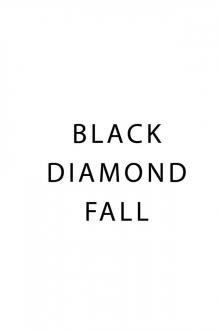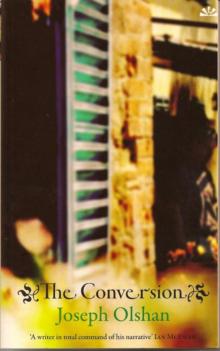- Home
- Joseph Olshan
The Conversion Page 7
The Conversion Read online
Page 7
The most recently written words of a dead man, even though I know they were written in jealous anger, truly sting. I gather together the loose leaves of the manuscript and stow them once again in my old computer bag. It is one thing to sense that you’ve made somebody miserable; it’s another thing entirely to read about it conclusively from their point of view and to know that they never really believed in you.
We’d certainly had discussions, Ed and I, about what I planned to do with my writing career, what I was conjuring up. He seemed surprised that I didn’t have a long list of subjects that I wanted to tackle. And yet I always felt that he was curious, not so much because he thought I should be working on something, anything, but rather because he wanted his companion, whomever he might be, to be engaged in something that could be discussed in mixed company, in short how his light might be refracted in the person closest to him. But then, too, he had to be the star, so my lack of conviction, my uncertainty about what came next, might have suited him on some level as well.
I felt stymied; my novella was basically a fictional autobiography of a drowning I witnessed at the age of six. The experience itself had been so traumatic, all the details of the terrible time were easily available to me. I wrote the first draft in a great heat, and what I put down didn’t really need much modification before I arrived at the final version. But I suspected this was a fluke; indeed, it was the only thing I’d ever written that I hadn’t obsessively rewritten. Moreover, while I was putting the final touches on the manuscript I fell in love with somebody and grew so distracted that it took me several months to finally finish my work. When I explained all of this to Ed, he ran with it, claiming he’d never let anyone stand in the way of his writing. He boasted that he’d worked every single day of his adult life, except for the two years when he was, by his own admission, “catatonically depressed” over the death of his student lover.
My heart is beating rapidly; I can feel it flip-flopping around in my chest. To distract myself, I approach Stefano’s bookshelf and automatically begin removing one Pléiade edition after another. I page through the lovely printed sheets that seem to be offering me a purchase on wisdom and clarity, but in light of my state of mind, the French seems particularly dense and hard to comprehend. If only I could find a way to start writing again.
I glance over at Ed’s manuscript and now feel myself unhealthily drawn back to it, as strong as the urge to scrape my fingernails across an itching rash. I have to know just how miserable I made him and can’t help but begin reading again, specifically about what happened in October, a month or so after I started living at his apartment.
Ed describes a particular evening when he’d escorted a rich unmarried woman of a certain age to a dinner party and how I met him afterward at a bridge that connects the Right Bank to the Ile Saint-Louis. This particular bridge is known as a cruising area; before Ed arrived, I was overtly propositioned by two old trolls. It was a chilly evening, and there were sprites of damp breezes pirouetting off the Seine. Finally I saw him rounding a corner, walking at a brisk pace. He was holding a tightly rolled-up copy of a newspaper. Upon reaching me, he held up France Soir and said nervously, “There’s something here I’d like you to see.” He led me over to the nearest street lamp, which arched above us with a long swanlike neck. He was dressed in a dark pinstripe Italian suit that, like many of his clothes, was beyond his means but which had been bought impulsively in the midst of a snowballing credit-card debt. The suit had an admirable, slimming effect.
Exfoliating the onion-thin newsprint pages, he showed me what at first appeared to be a typical gossipy article about a haute couture benefit on the avenue Victor Hugo, then zeroed in on a sentence. “And there was Madame Michel Soyer, whom we haven’t seen much of in the wake of her separation from her dashing husband, the president of Jeunesse Fabrique.”
Shocked, I reread the sentence, flummoxed by the word separation. In light of everything Michel had told me apropos his secure marriage, that nothing would ever induce him and Laurence to separate, I imagined it might have been somehow easier to read his obituary.
Pointing to the article, Ed said, “Is this the Michel you’ve been talking about?” He turned to me. “I thought when you first mentioned him something was familiar. When I read the article I realized that I actually knew him.” Ed tightly refolded the newspaper and with a smug grin said, “In fact, I have my own little histoire with him.”
I cringed. “Meaning?”
“Meaning we had a little flingée ten or twelve years ago when I was in my late forties. Still in my prime.” He laughed self-deprecatingly.
I looked at Ed in bewilderment; this was certainly a bizarre coincidence. He completely misinterpreted my expression. “What’s so surprising about that?”
“Nothing at all,” I shot back. “I just assumed he was strictly into younger guys.”
“I suppose that’s true enough, most of the time at least.” Ed tucked the newspaper under one arm and looked at me shrewdly. “But then knowing him the way I do, I could also say that I’m surprised that the two of you had an affair.”
“How so?”
“Being that he normally has a yen for slim, smooth Arab boys. Whereas you’re a brick shithouse Ashkenazi Jew with a furry chest.”
Insecure now, I said, “I guess he has more than one type.”
“The point is, Russell …” Ed faltered for a moment. “This guy has been around for a while. He’s officially in the closet, but I’ve seen him out at some of the bars. And his penchant for les Arabes precedes him. His is one of those very common situations here where the wife knows what goes on, turns a blind eye, and yet keeps him on a very long leash. He gets to do what he wants. And believe me, he likes to slum it, to mix with types he’d never come in contact with socially. The more exotic the better. You probably don’t even know this, but he’s said to have a taste for transvestites and transsexuals.”
I did actually know this but didn’t immediately reveal it. Indeed, before he got involved with me, Michel had been spending time with a very beautiful Moroccan transsexual.
Ed rubbed his forehead with one of his big, weathered-looking hands and went on, “This particular kind of divertissement is something that these upper-crust French queens adore. If Michel were straight, he’d probably be paying for high-class hookers.”
“Well, he’s bisexual,” I countered.
“No, Russell. Not bisexual. Queer. Queer as a three-dollar bill. Trust me. Je connais mes clients,” he said.
“That’s a cute expression,” I said mockingly.
“There’s no equivalent in English. So exacting, so imperious, so mocking. Leave it to the French.”
“Anyway, you can’t presume what somebody’s sexuality is unless you’re inside their head or under their skin.”
“Ah, but I can if I don’t fundamentally believe in bisexuality,” Ed said. “I think people will certainly try different things, different relationships if you will, but their gut, their visceral passion is either for one or the other. Don’t get me wrong. Gay men marry women all the time and make excellent husbands. And why not? You can care about somebody very deeply, you can love them, live with them for your entire life and be relatively content. But at least in the very beginning, if there isn’t the visceral yearning that, if not fed, will make you come completely unhinged, then there isn’t really a sexual bond to begin with.
“If you ask me, you were damn lucky to get away from Michel Soyer when you did,” Ed went on. “One could move the heavens, but cravings aside, there is too much that prevents him from leaving his wealthy femme.”
“But he did, according to this!” I cried, indicating the newspaper.
Ed made a dismissive gesture. “Oh, please. That’s just Gallic gossip. I don’t believe it for a second.”
“If you think that, then why did you show it to me?”
Ed looked at me shrewdly. “Because you read this paper and might have seen it for yourself.”
In
short, a preemptive move, I remember thinking to myself at the time. Ed wanted to make sure I distrusted the article’s implication; for if not, then my hope engine, constantly idling, would launch into forward gear.
And so I came back with, “Isn’t it said that gossip is more often true than not?”
Ignoring this, Ed continued, “These rags are desperate for rich people’s dish. He probably went to a few functions alone and they noticed and forced their own conclusions … down their readers’ throats, as it were. Trust me, he’s not separated. He’s still living in his high-class digs on the avenue Foch.”
I felt a sudden chill. “I don’t remember telling you he lived on the avenue Foch.”
“Darling, people—and certainly I—know where this lothario lives!” Ed waved his hand at me dismissively. “Remember, I had him myself! The apartments over there are so enormous that he and his wife could actually be separated and still live together and hardly see each other. Beyond this, many French couples I know spend substantial time apart, even have separate residences, but are not considered separated. So, in the end, there is no reason for your Michel Soyer ever to leave his wife. He has so much rope that he probably will never hang himself. So it’s good that you’re not with him anymore.”
Obviously not what I wanted to hear. And yet I also knew that by now Ed had invested heavily against the possibility of Michel Soyer’s ever being available again. I fell glumly silent, but finally thought of something. “Well, then, if he had so much rope, so much freedom, why did she force him to leave me?”
Ed shook his head just as a lashing of wind came in off the river and tousled his hair. He combed it back into place with his fingers and was delicate when he replied, “Well, that’s what he told you. But who knows the real truth? I mean, did you ever consider somebody else might have just come into his life and usurped you, exactly the way you did the Moroccan trans?”
How did Ed know that Michel had left the Moroccan for me? I was afraid to learn, to consider that he might have asked one of his many influential friends to do some digging. Or done his own, for that matter, through my personal papers and notes. Ed seemed to know quite a lot about Michel, and though he certainly was making a valid point, I found this disconcerting.
But yes, in moments of sadness and despair I’d wondered just this, if somebody else had come along and captured Michel’s attention, then chalked up my worrying to a sort of desperate self-pity. After all, Michel had seemed utterly sincere when he told me about the family friend spying on us in Saint Germain-en-Laye and his wife’s finding out and insisting that he end things with me. I’d also reasoned that if he’d met another guy—especially if the relationship was relatively new—this person would never have tolerated his going away with me for those four remarkable days in the South of France. Beyond this, during that brief holiday, I’d sensed urgency to Michel’s lovemaking, which made me conclude later on that he was losing me against his will. Conversely, had there already been another man in the equation, surely, out of obvious conflict Michel would have held some part of himself in reserve—and I would’ve sensed that immediately in tactile ways. I kept all this to myself, however; I didn’t want Ed to try to refute any of it. If my reasoning was specious, for the moment, I chose not to be the wiser.
Ed and I began strolling along the Seine, idly looking at the illuminated river churning over itself. A passing pleasure barge blared schmaltzy organ riffs. Suddenly Ed stopped and turned to me. Lighted by a nearby lamp, his disheveled hair looked radiant and youthful. “Were you safe with him?” he asked point-blank. It wasn’t the first time he’d quizzed me for specific details about my sex life with Michel.
“Of course,” I said.
“You’re such a liar,” he accused quietly.
I shrugged. “Don’t believe me.”
Shaking his head, Ed started walking again and I followed him for a half block or so. Then he stopped and drew close to me. “Look at me, bucko!” I could smell the wine on his breath. His eyes were bloodshot; he’d clearly had a lot to drink. “I’ll never forget the way you looked that first day I met you in the café. Completely taken over by him.”
“So?”
“You’d have done anything that guy wanted.”
“That’s not true.” I tried to sound measured rather than unnerved by his accusation.
“You’re deluding yourself.” His voice cracked as he began walking again, more briskly this time. With his back to me he said, “That one’s been around the block a few times. I just hope, for your sake, that you’ve taken those precautions you claim.”
The memoir’s description of that evening stops precisely with Ed’s last remark. And here precisely is where memoir ends and my memory takes over.
The following afternoon I knocked on the door of his study. Ed was staring out the window at an alder tree whose leaves had turned a deep vermillion, the sort of natural brilliance that I imagine to be impossible to recreate on a palette or in a dye. There was a blank piece of white paper lying on his blotter and a troika of pencils sharpened to needle point.
“How is it going?” I forced myself to ask.
He shook his head and said, “It’s not.”
“Well, I’m going to stop in at the Marmottan and then take a little stroll in the Bois.”
He slowly swiveled around, looked at me over his reading glasses, and, sounding inattentive, said, “Well, have fun. Don’t pick up anybody in the park.”
I went instead to the American Hospital in Neuilly for an HIV test. The nurse who attended me spoke with an Iowa twang, chattered about missing prairie life as her needle dipped deep into my elbow and sucked a dark red spurt into a glass tube. Floating above her prattle in a state of anxiety, I watched the sample accumulate with slight surface foam and realized it matched the color of the dying alder leaves. Then I shut my eyes for a moment and prayed for some mystical totem, a determinant as to whether or not I’d been infected by Michel, who, like many men, was perhaps a lot more promiscuous than he’d have liked me to believe. And then came an almost synesthetic recall of the last few problematic days I’d spent with James, the Episcopal priest, the harrowing conversation with his former lover, the betrayal of a liar, and the dread of infection. I once again damned myself for taking such risks, creating this present state of intolerable anxiety.
After my blood was whisked away to a lab, I took the Métro a few stops and got off at the Champs-Elysées. The street was bustling with squadrons of schoolchildren bumbling into one another with their Day-Glo backpacks, as well as with throngs of conspicuously foreign-looking tourists—groups of Japanese and waddling, overweight Americans. The moody slant of sunlight at this time of day seemed peculiarly autumnal. Finally entering the quieter 16th arrondissement, I turned down Michel’s street, the august avenue Foch.
It’s a broad boulevard that has for centuries been an enclave of wealthy, entitled Parisians. Lined with impressive buildings and brownstones that house both apartments and embassies, the avenue Foch has a sliver of park in its median with footpaths on either side. As I walked I remembered Gertrude Stein once lived here in a rambling apartment. I remembered that in the first volume of Remembrance of Things Past, Swann and Odette spend afternoons riding down a similar avenue in a private calèche. On one of these jaunts Swann comes to the stunning realization that he has somehow fallen deeply in love with “the wrong woman” who had never pleased him and who wasn’t remotely his social equal. It occurs to me now that neither was I Michel Soyer’s social equal. Beyond this, I’d also been his lover, which would have made me completely unacceptable within his particular 16th arrondissement milieu.
Strolling purposely along, I calculated that Madame Soyer, having two young daughters, would most likely be at home around five-thirty in the afternoon. I passed several impeccably dressed prostitutes who were curvaceous to an almost scoliotic degree. I knew them by their sauntering gait, but also because avenue Foch is famous for its high-class hookers. They were joined by trick
les of veiled Middle Eastern ladies making excursions from their flats to and from the various Arab embassies, fluttering along the boulevard in their burkas like tremulous moths. Just as I arrived at Michel’s building, a soignée woman who looked like Anita Ekberg in La Dolce Vita opened the door of a black Maserati, sat down on the passenger side, and smoothly, almost robotically rotated her hips to elegantly situate her legs in the tight confines of the sports car. Her calves, covered with flesh-tone nylons, were perfect. She caught my eye and, throwing me a saucy smile, looked down at her legs as though she knew how sexy they were, and then, once again, leered at me. The second glance alerted me that she was surely a prostitute. (Michel had told me that the well-heeled ones were often seen motoring up and down the boulevard in luxury cars.) Then, into the driver’s side climbed a swarthy older man with silver-flecked hair that was unctuously brilliantined. They began squabbling loudly and she threatened to put his testicles in a sling. The argument seemed to be about another woman.
This was actually my second visit to Michel’s apartment. When we were first involved he’d made it quite clear that this apartment and his life were off-limits to me. But then one day we were talking about Victor Hugo, and Michel mentioned owning a Pléiade edition of Les Misérables. Delighting in the astonished look on my face, he informed me that he owned more than fifty Pléiade editions. “I’d love to see them sometime if that’s ever possible,” I told him.
Hesitating thoughtfully, he then replied, “I know I say that I never bring you to my apartment.” The lovely cleft in his chin deepened as it often did when he was pondering something. “But I can trust you. I know you will appreciate my collection of books.”
He seemed to take our common passion for Pléiade as a mystical sign that he could bend the rules and bring me here to the avenue Foch on a weekend Laurence and their daughters would be at their country house in Brittany. It was an unspoken given that we would never make love in his apartment.

 Black Diamond Fall
Black Diamond Fall Cloudland
Cloudland Nightswimmer
Nightswimmer The Conversion
The Conversion